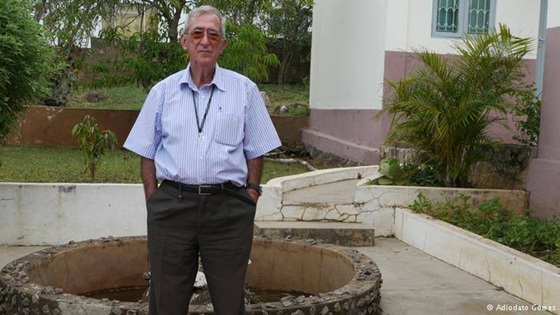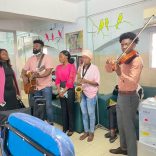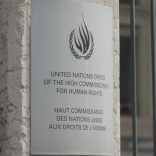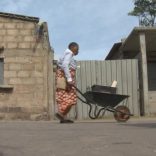16 Mozambicans trafficked to Laos rescued, repatriated
Mozambique | Vicente Berenguer Llopis: “The white priest with a black heart”

Photo: DW
- He moved to Mozambique in 1967, intending to preach the Gospel, but his mission ended up going further: the Spanish missionary focused on education as a way to combat poverty and denounced the Wiriyamu Massacre.
When he arrived in Mozambique, Vicente Berenguer settled in the central province of Tete, later moving to the capital, Maputo, and today lives in the town of Ressano Garcia, on the border with South Africa.
In Moatize, Tete, he realized that most of the Mozambicans he came into contact with had only completed fourth grade and that many were illiterate. Thus began his involvement in education: in the coal-mining town, he ordered the construction of the first high school.
In the 1970s, Berenguer faced Portuguese colonialist policies that excluded the unassimilated Black population. He was interrogated several times by the PIDE, the Portuguese political police, and asked to leave Mozambique.
But the people trusted him, the Spanish priest says.
DW Africa: Some Mozambicans see you as the “white priest with a black heart.” How do you interpret this nickname?
PV: I was at the Changara mission. Frelimo [Mozambican Liberation Front] was already descending from the northern areas of Mucumbura to the Changara area and began to have contact with both the mission and the population. It was a system they used. Then, one day in a village, Cancuni, there was a group of men I knew talking, and when I arrived, they all shut up. Old Zoni used this phrase: “But why did we shut up if Father Vicente is white, but his heart is black like ours?” I wanted to say: “He’s feeling like a Mozambican.”
DW Africa: As an outsider, as a Spaniard, who wasn’t directly concerned by Mozambique’s independence, how did you become interested in this cause?
PV: I think that [in the face of] any injustice, wherever it may be, even if it’s not in our country, we are obliged to defend people’s rights. It was clear that these people had the right to independence. Therefore, even though I was Spanish, I was working here and had to learn about these people’s rights.
DW Africa: And you even raised your voice directly in support of this cause. When did this active stance begin?
PV: We can’t say there was a specific moment when we raised our voices. Perhaps it was the day-to-day work that made someone realize that we were truly in favour of independence. There were certain moments when we had to speak out. There was a famous meeting among the white priests, and yes, we openly declared that these people had the right to independence. “We’re going to be expelled, but for now we can work here, still raising awareness about many things.” So the white priests decided to make a statement. When they landed a plane at Beira airport, I think 44 were expelled. We continued working here, raising awareness of their reality, their pride in their own culture, their pride in being Mozambican, their pride in being African, and their rights as an independent people, bringing them the wealth of their nation.
DW Africa: What distinguished your daily life during the liberation struggle from a time when there was no armed struggle?
PV: It was a more tense life. Because we can’t forget that we were surrounded by a Portuguese army, we were surrounded by a PIDE (Institutional Security Force), we were surrounded by many Portuguese people who felt hurt when the rights of these people were discussed. So, it was a constant tension.
I was interrogated by the PIDE many times. They would find, for example, medicines of Spanish origin in bases they attacked or in villages. And they would ask me if I knew anything. Yes, I did. “I was the one who delivered it.” “So, you delivered it to FRELIMO.” “No, I delivered it to the population. I never saw FRELIMO written on anyone’s head. I deliver it to the population, even blankets and all that.”
Once I went further inland and the Portuguese troops were rounding up people to go to the villages, and I was caught by the Portuguese troops. So they wanted me to go back, and I said, “I’ll be arrested. Now, if I’m not arrested, I’ll continue working here.” There was that concordat, and it was very difficult for them to arrest you without a very, very clear reason. So, the times I was interrogated by the PIDE (Inspectorate of the People’s Liberation Army) in Tete, it was simply based on suspicion.
DW Africa: What consequences did these interrogations have?
PV: [The interrogations showed that] we were truly being watched. Even within groups of Mozambicans, there were people who could tell the PIDE about parts of your life and your work.
DW Africa: On December 16, 1972, Portuguese troops attacked three villages in Tete province: the towns of Chawola, Juwau, and Wiriyamu. The survivors of the massacre, which became known as the Wiriyamu Massacre, reported the events to Spanish missionaries. One of them was you…
PV: I was traveling by bus from Changara to Tete. And when we passed those villages, they were all in flames, and everyone was running to the road. We stopped there, people were screaming and saying they were being killed, slaughtered, bombed, and they climbed onto the bus until they couldn’t fit any more, and we went to Tete. Others went on foot and escaped as best they could. Tete isn’t that far from Wiriyamu. So, I was, you might say, a witness, because I saw the flames and heard those people.
DW Africa: You denounced the Wiriyamu Massacre internationally. How did you report it?
PV: When Marcelo Caetano visited England, Adrian Hastings [an English Catholic priest] published this report we wrote. Everyone contributed what they could, some with names, others with ideas. Well, they denied it was real and even denied the existence of Wiriyamu. And through Justice and Peace, we went to Germany, the Netherlands, Belgium, and England. So, we denounced it through television, through lectures, through everything. We asked for a commission to come here to verify that Wiriyamu existed, that the massacres had been carried out, and that hundreds of people were still there. In the Netherlands, Cardinal Alfrink immediately called Rome, and the church and politicians were very involved in this.
DW Africa: There are historians who believe that this massacre changed the course of the colonial war. Do you agree?
PV: Well, I personally don’t think so. I think things were already falling apart, even the troops were discouraged. There may have been strong army leaders, but what I saw with the Portuguese soldiers was that they were discouraged, saying this wasn’t for them, it was someone’s economic greed, it wasn’t for them or for Portugal. I think things were already falling apart. There had been important massacres before, in Mucumbura and Inhaminga. But this one in Wiriyamu was ignored. And they also took advantage of Marcelo Caetano’s trip abroad and [gained more exposure], but I think they were already preparing. However, while Mucumbura was 300km from Tete, Wiriyamu was at the gates of Tete. And the city of Tete was in danger. And the world was shocked when [the reports] were published.
DW Africa: Do you think there are still wounds in the Mozambican population related to the liberation war?
PV: No, I think Frelimo always knew very well how to explain that the war wasn’t against the Portuguese, it was against the Portuguese army, the Portuguese government. So, I don’t think there were any wounds, let’s say. If there are any wounds, they may be from the more extremist, racist sense, seeing that there are white Mozambicans here with full rights, from four, five, six generations. They may feel a bit wounded, but from the liberation struggle, I don’t think so.
DW Africa: Was there any episode of the liberation war that particularly impacted you?
PV: A very funny [episode] was that I once received a package from Spain, some small bamboo canes, because in the village where my brother lived, they make a lot of furniture from imported bamboo. And he wanted to come here to see if there was any. And I said that here, where I was, there was no bamboo. And they thought I didn’t know what bamboo was. So they sent me some small pieces of bamboo in a little box. And then the PIDE (Inspectorate of the Environment) in Changara called me at the postoffice to tell them what they were. “This is bamboo.” “Break it open to find out if it’s bamboo or not. Let’s break it open to find out what’s inside.” “You can break it open, but it’s bamboo.” So, it’s funny to be suspicious of some small canes. I don’t know if there was some secret, but it was just bamboo. It’s a funny thing.












Leave a Reply
Be the First to Comment!
You must be logged in to post a comment.
You must be logged in to post a comment.